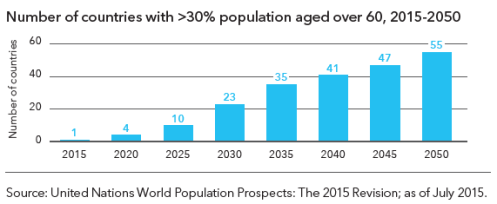Changes in global demographics; world population, density, ethnicity, education level and other aspects of the human population, will bring about significant social change, and therefore challenges and opportunities, for both government and business. This megatrend underpins other structural shifts, such as technological development and shifting economic power. While the changes will vary by region, they will have a profound effect on local and global markets and societies.
The impact
There will be many more people in the world. According to the UN, the global population is forecast to increase by more than one billion by 2030, with most of this growth coming from the emerging markets. By 2050, the UN estimates that 80%of the global population over the age of 60 will be in countries that are currently deemed to be "less developed".
An ageing population
Japan is the only country in the world where 30% of the population is over the age of 60. The UN's latest demographics report forecasts that, by 2050, this will be the case in 55 countries.

People will be living longer in retirement, which will result in the need for large-scale changes in government policy. This will also create a strain on healthcare services and providers, with many nations enforcing laws to ensure the elderly are properly cared for.
A global retirement savings gap
According to analysis by the World Economic Forum (WEF), the retirement savings gap across eight major economies is growing by $28 billion every 24 hours and could reach $400 trillion by 2050 – around five times the size of the global economy today.
Producing fewer children
We're having fewer children – particularly in wealthier and educated sections of society. This has potentially far-reaching consequences for business, including lower productivity, less labour-force participation, and less investment growth. Younger generations will be increasingly burdened with the expectation of looking after the elderly, which in turn could further reduce productivity.
The impact of changing demographics is far-reaching. From the demand for products to changes to the workforce and family structures. While many businesses are particularly adept at identifying the threats and opportunities of such change, they don't, after all, happen overnight, governments may find the process more challenging, particularly if it means making unpopular policy changes that could influence voters.
Here are some of the key changes that may impact investors in the medium to long term:
Healthcare spending
In the U.S. alone, healthcare spending is set to rise by 8% of GDP each year between now and 2040. That’s around $3,400 billion every year.
Pension income solutions will increase in importance
There will be a renewed focus on saving for retirement and finding effective ways of drawing an income when people retire. As a result, there could be a greater need for financial help, and the rise of robo-advice solutions.
Replace people with robots
As populations age, it becomes increasingly likely that businesses will use technology to plug the shortfall in labour supply. Robots are more productive, they don't sleep, get sick or need performance reviews, although they may have technical problems. As a result, there will be a greater need for skilled jobs such as data scientists.
Consumer preferences are changing the food industry
Consumers are increasingly focused on what they eat, how they are eating it and how it is produced; creating significant changes in the food supply chain. For instance, organic foods sales in the US has risen 224 per cent from 2005 to 2016.
Fresh food is being preferred over processed foods and products with specific health-related benefits, such as avocadoes and berries, have seen huge growth. Consumers want their food to be more convenient, resulting in more online delivery, meal-kit solutions and convenient snacking options at supermarkets.
This post initially appeared on Morningstar.com.au